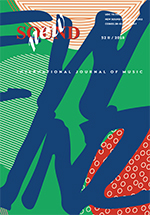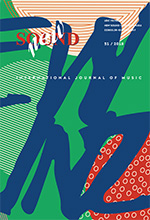Issue No. 24
Composer Speaks
Sonja Marinković – INVENTION IS MORE IMPORTANT. Interview with Milan Mihajlović
Download: ser / eng
Studies
Mirjana Veselinović-Hofman – MULTIMEDIA ARCHIVES AS A STEP TOWARDS WORLD MUSIC
Abstract: World music is considered in this study as a collective category that refers to the entirety of artistic music achievements in the world. Therefore, it is not treated as a trend that aims to promote one particular kind of music or style or composer or piece of music or some specific “mingling”…, in such a way that they become fashionable, even elitist. And yet, neither is it considered here as “world” because it is anticipated that it will neutralize ethnic and stylistic peculiarities and advocate common, “universal” music features and practice. On the contrary, it is considered as “world” because it is expected that it will demonstrate an increased capacity to encompass and offer diversity that will provide complex layers of richness and “entirety”. So, world music is conceived of and treated as the awareness of the possibility of accessing any music stratum and fact belonging to the global music heritage, meaning, the music heritage worldwide, stored in “network institutions” such as libraries and archives. In other words, the embodiment of world music presumes the existence of a store of world music data as well as a direct accessibility.
This is precisely why the phenomenon of world music is elaborated in this study in the metaphorical sense through a comparison with the above mentioned network institutions. In this elaboration, the notions of world music library and world music archive are introduced and examined. The finding of this investigation is that these notions cross over considerably: practical aspects of the world music archive and of world music are closer than those of the world music library and world music. The main reason is that, ultimately, world music requires first of all accessibility of sound, which cannot yet be entirely provided by a world library. But a world music archive can - due to its audiovisual nature - make possible listening to every music example stored in it. In this way, technologically, such archives essentially correspond to what world music “expects” from its embodiment.
Download: ser / eng
Miško Šuvaković – SURPLUS VALUE: MUSICOLOGY AND ETHNOMUSICOLOGY IN FIELD OF DISCOURSE ON WORLD MUSIC
Abstract: In short discussion that will follow, I will perform two characteristic interpretative steps. The first one will focuss on the comparative research of the status and function of musicology and ethnomusicology in relation to the music as social practice. The second one I will interprete the specific musical practice, as World Music, in relation to the schemes that I came upon in the first part of my discussion. Term World Music has, frekwently, three uses: (1) World Music is collective term for different kind of music that include into the collective field of musical creativity by different people in the world, the term is analoguous to the term world painting, or world literature: (2) World Music is a term for 'world of music', which means the contextual frame of meaning, knowledge, understanding, and identifications through which the musical work of art appears in its complexity, the term is analogouos to Arthur C. Danto’s term artworld; and (3) World Music denotes genre or transgenre or polygenre of popular music, which is based on Western interpretation of folk (authentic, neo or post-folk) non-European or non-high artistic and non-popular-urban-mass (rock and pop) musical models and Western tradicions. Term World Music is most frequently used in the third sence as genre, transgenre or polygenre of popular music.
Download: ser / eng
Interpretations
Dimitrije O. Golemović – WORLD MUSIC
Download: ser / eng
Mladen Marković – WORLD CONTRA ETHNO... AGAINST AS USUAL
Abstract: The term world music has been widely accepted as a marketing sign for music "other" then modern pop-music. However, in our coutry, for various reasons described in this paper, this term is substituted by the prefix ethno, thus making some special types of music declared as ethno-pop, ethno-jazz, even ethno-folk. Basically, the main reason of the existance of such term is exclusively connected to market, being just a device for promotion of otherwise un-interesting un-traditional (un?)music...
Download: ser / eng
New works
Ivana Stamatović – A DYPTICH ON SILENCE AND LANGUAGE
Abstract: The text discusses the compositions Obični razgovori (Ordinary Conversations) and Nad vodom (Above Water) of the Belgrade composer Ivana Stefanović. The interpretative framework is determined by two references. On the one hand, the author herself points to the phenomenon of silence by dedicating the entire programme of the auteur concert, at which the analyzed were premiered, precisely to this phenomenon. On the other hand, verbal language, as the subject of a discourse on the compositions Obični razgovori and Nad vodom, imposes itself owing to the very title of the first composition, that is, the content of the verses from select songs of Hellenic melic poets as the poetic basis of the second composition. The paper examines the specificity of individual interrelation of these phenomena with music, as well as the field of their intersection.
Download: ser / eng
Analyses
Ivan Čolović – THE BALKANS IN A NARRATIVE ABOUT WORLD MUSIC IN SERBIA
Abstract: The topic of the Balkans appears in the narrative about ethnic (World) music. Some musicians associate their groups and works with the Balkans, giving them names featuring the word Balkan. The Balkans is used to connote a whole array of values: antiquity, authenticity, naturalness, spontaneity, the combination of religious and folk culture. Music critics, organizers of music events featuring the representatives of ethnic music, as well as the very musicians of such orientation, claim that they want to improve the picture of the Balkans, which is full of negative stereotypes. Positive stereotypes, most notably the stereotype about the music of the Balkans as an expression of the multiculturalism of that region, are created for that purpose. However, in such an attempt one boundary has not been transcended, namely the boundary between the supposedly authentic music of the Balkans and oriental music elements, which are still considered as alien to the Balkans.
Download: ser / eng
Festivals and Symposia
Jelena Janković – MUSIC WITHOUT BORDERS WORKSHOP, BALCHIK, JUNE 21–22, 2003
Download: ser / eng
Ira Prodanov – A NEW PRODICTION OF THE FLYING DUTCHMAN AT THE 2003 WAGNER FESTIVAL IN BAYREUTH
Download: ser / eng
Tatjana Marković – MUSIC IN ART: ICONOGRAPHY AS A SOURCE FOR MUSIC HISTORY. New York City, USA, 5–8 November 2003
Download: ser / eng
Selena Rakočević – DANI VLADE S. MILOŠEVIĆA (THE DAYS OF VLADO S. MILOŠEVIĆ). Banjaluka, 2004
Download: ser / eng
Nice Fracile – THE INTERNATIONAL COUNCIL FOR TRADITIONAL MUSIC. Schloß Seggau, April 27–May 1, 2004
Download: ser / eng
Donata Premeru –THE NINTH INTERNATIONAL FESTIVAL OF NEW MUSIC THEATRE
Download: ser / eng
Reviews
Tatjana Marković – ZDRAVKO BLAŽEKOVIĆ: GLAZBA OSJENJENA POLITIKOM. STUDIJE O HRVATSKOJ GLAZBI IZMEĐU 17. I 19. STOLJEĆA [MUSIC IN THE SHADOWS OF POLITICS. STUDIES ON CROATIAN MUSIC BETWEEN SEVENTEENTH AND NINETEENTH CENTURY]. Zagreb, Matica hrvatska, 2002, 312, ISBN 953-150-672-8
Download: ser / eng
Ana Kotevska – DICTIONNAIRE BERLIOZ. Frayad, Paris, 2003 (pp. 613)
Download: ser / eng
Milica Gajić – SNEŽANA NIKOLAJEVIĆ: EKRAN SRPSKE MUZIKE (THE SCREEN OF SERBIAN MUSIC). Belgrade: Radio-televizija Srbije, 2003 (128+CD ROM with music and video examples)
Download: ser / eng
Ivana Vuksanović – Muzička analiza I (MUSICAL ANALYSIS I). (CD, capacity 126 MB). Authors: Miloš Zatkalik, Milena Medić, Smiljana Vlajić. Klio: Beograd 2003
Download: ser / eng
Defended Theses
Ana Stefanović – RAZVOJ ODNOSA MUZIKE I TEKSTA U FRANCUSKOJ BAROKNOJ OPERI (1675–1733): HERMENEUTIČKI PUT (THE DEVELOPMENT OF RELATIONSHIP BETWEEN MUSIC AND TEXT IN FRENCH BAROQE OPERA (1675–1733): THE HERMENEUTIC PATH). A Resume
Download: ser / eng
Katarina Tomašević – SRPSKA MUZIKA NA RASKRŠĆU ISTOKA I ZAPADA? O DIJALOGU TRADICIONALNOG I MODERNOG U SRPSKOJ MUZICI IZMEĐU DVA SVETSKA RATA (SERBIAN MUSIC AT THE CROSSROADS OF THE EAST AND THE WEST? ON DIALOGUE BETWEEN THE TRADITIONAL AND THE MODERN IN SERBIAN MUSIC BETWEEN THE TWO WORLD WARS)
Download: ser / eng
Tatjana Marković – TEORIJA O STILU I SRPSKI MUZIČKI ROMANTIZAM (THEORY OF STYLE AND SERBIAN MUSIC ROMANTICISM)
Download: ser / eng
New Sound CD No. 24
1. Milan Mihajlović: Notturni
2. Sound examples with the study World Music by Dimitrije Golemović
3. Sound examples with the study World Contra Ethno – Against as Usual by Mladen Marković
4. Ivana Stefanović: Ordinary Conversations, Above Water


